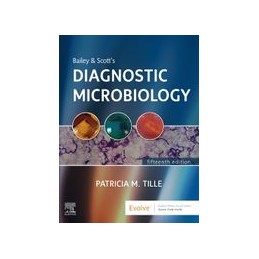- Obniżka


 Dostawa
Dostawa
Wybierz Paczkomat Inpost, Orlen Paczkę, DHL, DPD, Pocztę, email (dla ebooków). Kliknij po więcej
 Płatność
Płatność
Zapłać szybkim przelewem, kartą płatniczą lub za pobraniem. Kliknij po więcej szczegółów
 Zwroty
Zwroty
Jeżeli jesteś konsumentem możesz zwrócić towar w ciągu 14 dni*. Kliknij po więcej szczegółów
**Textbook and Academic Authors Association (TAA) Textbook Excellence Award Winner, 2024**
**Selected for Doody’s Core Titles® 2024 in Laboratory Technology**
Perfect your lab skills with the essential text for diagnostic microbiology! Bailey & Scott’s Diagnostic Microbiology, 15th Edition Is known as the #1 bench reference for practicing microbiologists and as the preeminent text for students in clinical laboratory science programs. With hundreds of full-color illustrations and step-by-step methods for procedures, this text provides a solid, basic understanding of diagnostic microbiology and also covers more advanced techniques such as matrix-assisted laser desorption time-of-flight mass spectrometry. Written by noted CLS educator Dr. Patricia Tille, Diagnostic Microbiology has everything you need to get accurate lab test results in class and in clinical practice.
Opis
Part IBasic Medical Microbiology?
Chapter 1Microbial Taxonomy?
Chapter 2Bacterial Genetics, Metabolism, and Structure?
Chapter 3Host-Microorganism Interactions?
Part IIGeneral Principles in Clinical Microbiology?
Section 1Safety and Specimen Management?
Chapter 4Laboratory Safety?
Chapter 5Specimen Management?
Section 2Approaches to Diagnosis of Infectious Diseases?
Chapter 6Role of Microscopy?
Chapter 7Traditional Cultivation and Identification??
Chapter 8Nucleic Acid-Based Analytic Methods for Microbial Identification and Characterization?
Chapter 9Overview of Immunochemical Methods Used for Organism Detection?
Section 3Evaluation of Antimicrobial Activity?
Chapter 10Principles of Antimicrobial Action & Resistance?
Chapter 11Laboratory Methods and Strategies for Antimicrobial Susceptibility Testing?
Part IIIBacteriology?
Section 1Principles of Identification?
Chapter 12Overview of Bacterial Identification Methods and Strategies?
Section 2 Catalase-Positive, Gram-Positive Cocci?
Chapter 13Staphylococcus, Micrococcus, and Similar Organisms?
Section 3Catalase-Negative, Gram-Positive Cocci?
Chapter 14Streptococcus, Enterococcus, and Similar Organisms?
?Section 4Non-Branching, Catalase-Positive, Gram-Positive Bacilli?
Chapter 15Bacillus and Similar Organisms?
Chapter 16Listeria, Corynebacterium, and Similar Organisms?
Section 5Non-Branching, Catalase-Negative, Gram-Positive Bacilli?
Chapter 17Erysipelothirix, Lactobacillus, and Similar Organisms?
Section 6Branching or Partially Acid-Fast, Gram-Positive Bacilli?
Chapter 18Nocardia, Streptomyces, Rhodococcus, and Similar Organisms?
Section 7Gram-Negative Bacilli and Coccobacilli (MacConkey-Positive, Oxidase-Negative)?
Chapter 19Enterobacteriaceae?
Chapter 20Acinetobacter, Stenotrophomonas, and Other Organisms?
Section 8Gram-Negative Bacilli and Coccobacilli (MacConkey-Positive, Oxidase-Positive)?
Chapter 21Pseudomonas, Burkholderia, and Similar Organisms?
Chapter 22Achromobacter, Rhizobium, Ochrobactrum, and Similar Organisms?
Chapter 23Chryseobacterium, Sphingobacterium, and Similar Organisms?
Chapter 24Alcaligenes, Bordetella (Nonpertussis), Comamonas, and Similar Organisms?
Chapter 25Vibrio, Aeromonas, Plesiomonas shigelloides, and Chromobacterium violaceum?
Section 9Gram-Negative Bacilli and Coccobacilli (MacConkey-Negative, Oxidase-Positive)?
Chapter 26Sphingomonas paucimobilis and Similar Organisms?
Chapter 27Moraxella?
Chapter 28Eikenella corrodens and Similar Organisms?
Chapter 29Pasteurella and Similar Organisms?
Chapter 30Actinobacillus, Kingella, Cardiobacterium, Capnocytophaga, and Similar Organisms?
Section 10Gram-Negative Bacilli and Coccobacilli (MacConkey-Negative, Oxidase-Variable)?
Chapter 31Haemophilus?
Section 11Gram-Negative Bacilli that are Optimally Recovered on Special Media?
Chapter 32Bartonella and Afipia?
Chapter 33Campylobacter, Arcobacter, and Helicobacter?
Chapter 34Legionella?
Chapter 35Brucella?
Chapter 36Bordetella pertussis and Bordetella parapertussis?
Chapter 37Francisella?
Chapter 38Streptobacillus moniliformis and Spirillum minus?
Section 12Gram-Negative Cocci?
Chapter 39Neisseria and Moraxella catarrhalis?
Section 13Anaerobic Bacteriology?
Chapter 40Overview and General Considerations?
Chapter 41Laboratory Considerations?
Section 14Mycobacteria and Other Bacteria with Unusual Growth Requirements?
Chapter 42Mycobacteria?
Chapter 43Obligate Intracellular and Nonculturable Bacterial Agents?
Chapter 44Cell Wall-Deficient Bacteria: Mycoplasma and Ureaplasma?
Chapter 45The Spirochetes?
Part IVParasitology?
Chapter 46Overview of the Methods and Strategies in Parasitology?
Chapter 47 Intestinal Protozoa?
Chapter 48Blood and Tissue Protoza?
Chapter 49Protozoa from Other Body Sites?
Chapter 50 Intestinal Nematodes?
Chapter 51Tissue Nematodes?
Chapter 52Blood Nematodes?
Chapter 53 Intestinal Cestodes?
Chapter 54Tissue Cestodes?
Chapter 55Intestinal Trematodes?
Chapter 56 Liver and Lung Trematodes?
Chapter 57Blood Trematodes?
Part VMycology?
Chapter 58Overview of Fungal Identification Methods and Strategies?
Chapter 59Hyaline Molds, Zygomycetes, Dermatophytes, and Opportunitistic and Systemic Mycoses?
Chapter 60Dematiaceious Molds?
Chapter 61Opportunistic Atypical Fungs: P. jiroveci?
Chapter 62The Yeasts?
Chapter 63Antifungal Susceptibility Testing, Therapy and Prevention?
Part VIVirology?
Chapter 64Overview of the Methods and Strategies in Virology?
Chapter 65Viruses in Human Disease?
Chapter 66Antiviral Therapy, Susceptibility Testing and Prevention?
Part VIIDiagnosis by Organ System?
Chapter 67Bloodstream Infections?
Chapter 68Infections of the Lower Respiratory Tract?
Chapter 69Upper Respiratory Tract Infections and Other Infections of the Oral Cavity and Neck?
Chapter 70Meningitis and Other Infections of the Central Nervous Systems?
Chapter 71Infections of the Eyes, Ears, and Sinuses?
Chapter 72Infections of the Urinary Tract?
Chapter 73Genital Tract Infections?
Chapter 74Gastrointestinal Tract Infections?
Chapter 75Skin, Soft Tissue, and Wound Infections?
Chapter 76Normally Sterile Body Fluids, Bone and Bone Marrow, and Solid Tissues?
Part VIIIClinical Laboratory Management?
Chapter 77Quality in the Clinical Microbiology Laboratory?
Chapter 78Infection Control?
Chapter 79Sentinel Laboratory Response to Bioterrorism?
Glossary?
Indeks: 60106
Autor: Michael R. Barer
A Guide to Microbial Infections: Pathogenesis, Immunity, Laboratory Investigation and Control
Indeks: 31287
Autor: Jennie Wilson
An Introduction for Healthcare Professionals
Indeks: 80707
Autor: Manfred Weidmann
Indeks: 80388
Autor: Melphine Harriott
